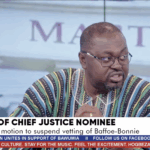
Deputy General Secretary of the United Party, Nana Yaw Sarpong, has argued that the work of Ghana’s judiciary must continue despite the ongoing legal challenge surrounding the removal of Chief Justice Gertrude Torkornoo.
According to him, the country’s constitution makes it clear that judicial authority cannot be suspended or halted due to administrative or political disputes.
Citing Article 125 of the 1992 Constitution, Mr Sarpong explained that “the judicial power of Ghana shall be vested in the judiciary,” and that neither the President, Parliament, nor any other organ of government has the power to interfere with or halt its operations.
“In my view, the judiciary cannot be halted. It has to go on. The judiciary does not end in the office of the Chief Justice,” he stressed.
He added that while the ongoing court case over the removal of the Chief Justice should be respected, the process to appoint a new Chief Justice must not be frozen.
“The two can travel together. If there is a need for us to come back and deal with the matter when the litigation ends and the final judgment is given, why not? We will. But until then, we should have a Chief Justice,” Mr. Sarpong said, adding that the administration and supervision of the judiciary must continue.
His comments come amid the Minority in Parliament’s demand for the suspension of the vetting of Justice Paul Baffoe-Bonnie, who has been nominated to replace Chief Justice Torkornoo.
The Minority filed a motion in the Speaker’s office urging Parliament’s Appointments Committee to halt the vetting until the court cases challenging Justice Torkornoo’s removal — currently before both the High Court and the ECOWAS Court of Justice — are determined.
Mr. Sarpong, however, maintained that halting the vetting or judicial processes would set a dangerous precedent.
He likened it to a situation where “the country would be left without a president” if similar logic were applied to the executive arm of government.

